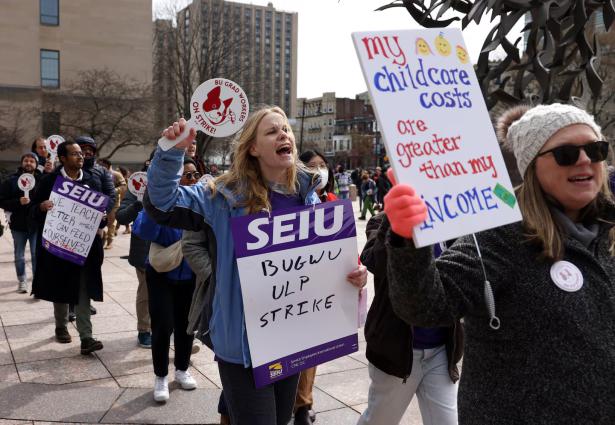Boston University and its graduate student union have agreed on terms for a new contract that would raise the graduate students’ pay, benefits, and job protections and end the longest such strike in American history.
The agreement, announced jointly on Friday afternoon, concludes seven months of sparring between the administration and the union that represents 3,000 graduate students. Many teach classes, grade papers, and conduct research, and argued the school severely underpaid them for essential work.
Now the first-of-its-kind contract includes provisions to raise the annual stipend PhD workers receive to at least $45,000, or $20 an hour for graduate students, which would be as much as a 60 percent bump for the lowest paid PhD students. It also expands health care benefits, parental leave, and commuting discounts, and introduces a $3,500 annual subsidy for child care.
Union members have until Thursday to vote on the agreement.
Meiya Sparks Lin, a graduate student in the English department, said the effort is proof that strikes work, even when they drag on. The walkout at times got contentious; the union, which is affiliated with SEIU Local 509, has filed multiple unfair labor practices against the school claiming harassment and retaliation.
“We’ve won transformational demands that will fundamentally change our relationship to each other, to our work, and to our workplace,” Sparks Lin said. “And it’s going to be an ongoing fight.”
A BU spokesperson directed the Globe to a university news release in which provost Gloria Waters called the agreement “fair and competitive.” She emphasized that it calls for the school to pay PhD students through the year, rather than just for the eight months of the academic year.
“I appreciate and respect all of the time and effort our graduate students have put into understanding the needs of their fellow students, and advocating for the needs of all graduate students,” Waters said.
As the strike dragged through the summer and into its second academic year, many BU graduate workers had already returned to their jobs, while a smaller, vocal contingent of organizers held the picket line. But over the two semesters, the strike disrupted some classes. “Replacement workers” hired by BU covered their roles as needed since the strike started in March.
The union action arose from complaints from students that they were overworked and underpaid.
Previously, BU grad workers received free tuition and eight-to-12-month stipends starting at $26,000 and $39,000, respectively, for what is supposed to be a 20-hour work week. The stipend pay for PhD students clocked in between $27,000 and $40,000 per year for the same workload. BU also pays for the tuition and health insurance premiums of all PhD students.
Separately, a graduate student worker who did not strike is attempting to sue the university and seeking class action status saying the school did not pay workers properly during the strike.
Roughly 300 resident assistants at BU also recently secured a three-year contract with the college that includes $1,700-per-semester stipends and meal plans for workers that oversee dorm life.
Clare Hammonds, a labor studies professor at the University of Massachusetts Amherst, said that the actions at BU are part of a changing perception by student workers’ of their roles at colleges and a push to be treated more like employees who help the schools function, rather than simply students there to learn. Many graduate students live in expensive areas and rely on universities as their source of income and, sometimes, housing.
“In the public consciousness, they’re students. So why would they make money? They’re going to school,” Hammonds said. “But the reality is, they do a lot of work. Universities do not function without them, without the teaching and research they do. That’s built into the model of the university, and people are exhausted by it.”
Diti Kohli can be reached at diti.kohli@globe.com. Follow her @ditikohli_.


Spread the word